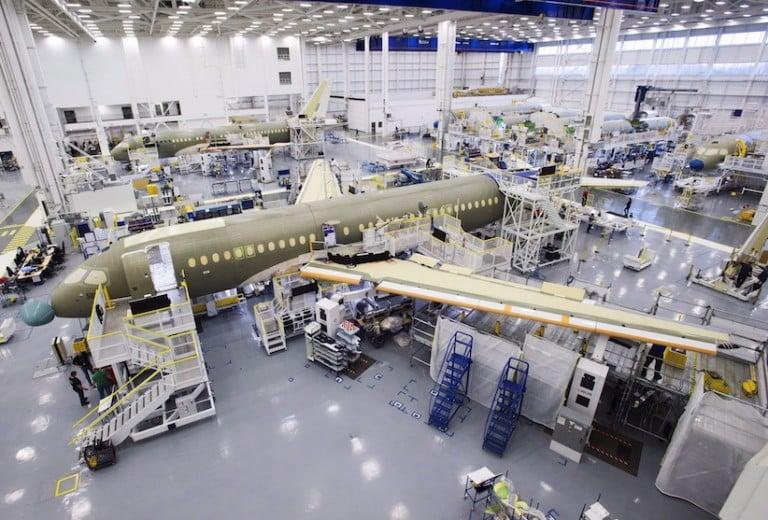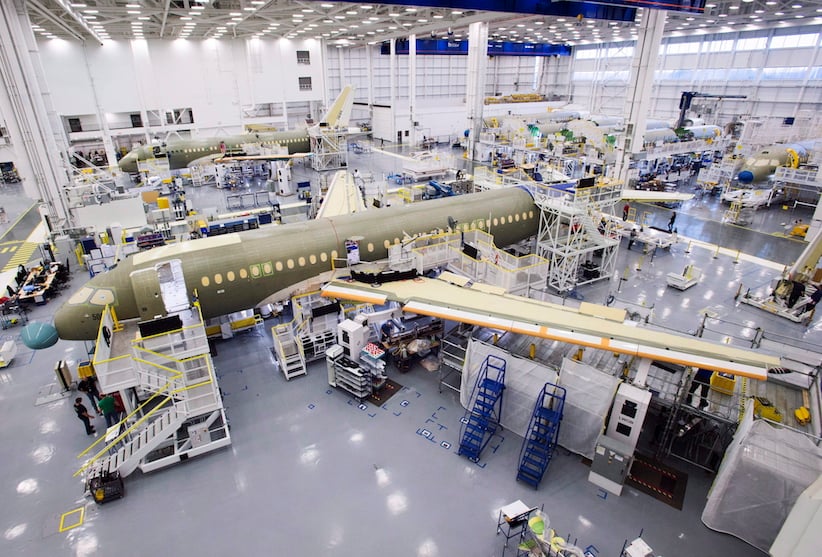Why Bombardier and Ottawa shouldn’t make job promises they can’t keep
Opinion: Airbus’ PR machine is in overdrive, but any job promises attached to its takeover of the CSeries will almost certainly be broken

Bombardier’s CS100 assembly line is seen at the company’s plant Friday, December 18, 2015 in Mirabel, Que. After years of delays and cost overruns, Bombardier’s CSeries commercial aircraft has been certified by Canada’s transportation regulator. THE CANADIAN PRESS/Ryan Remiorz
Share

We’ve seen this movie before so don’t assume a happy ending.
A foreign multinational snaps up a Canadian competitor to increase its global market share. At the time of the takeover the Canadian government and foreign buyer embark on a whitewashing exercise to make the deal palatable to Canadians.
Promises are made that jobs will not be cut, the new parent company will invest in plant and equipment and Canada will be a better place. Then a few years later come the broken promises and job cuts.
READ: Trudeau’s banana republic approach to Bombardier and Boeing
Just ask the employees at Stelco, Inco and Falconbridge. Or countless other companies abroad who have been snapped up by foreign competitors. It’s rarely a pretty sight and it almost always results in job losses.
The latest Canadian company to get caught in the crosshairs of a foreign buyout is Montreal’s Bombardier Inc.
Given the track record that foreign takeovers have in this country, it’s hard to believe Bombardier when it says that a proposed deal with Airbus to share the business of building and selling the CSeries line of jets (the company would retain its railway manufacturing assets) will result in no job losses. We’ve just been duped by this PR mantra before.
Consider that under the proposed deal multinational aerospace giant Airbus will take a 50.01 per cent stake in Bombardier’s C Series project and move some of the production to a plant in Alabama.
The strategy is twofold. One, it’s a clever and expedient way of getting around an anti-dumping duty of 300 per cent won by Seattle-based competitor Boeing and backed by President Donald Trump.
And two, it adds some serious marketing muscle to Bombardier’s 130-seater jet, which has burned up $6 billion in development costs for Bombardier and its generous benefactors at various levels of government in Canada. Sure, Bombardier makes great planes but it was not able to crack the market for regional jets in a significant way by itself.
Under the lopsided deal, however, Bombardier has given up control of the CSeries. It hasn’t just bet the farm, it has sold a majority interest for literally zero cash. Neither Bombardier or Ottawa are in a position to make any promises about the future because Airbus has installed itself in the cockpit of the CSeries.
WATCH: Bombardier’s trade dispute with Boeing, explained with toy planes
The federal government is talking about getting 20-year production guarantees before signing off on the Airbus deal. In fact, Economic Development Minister Navdeep Bains is dangling the prospect of 5,000 jobs in Mirabel, Que. when the CSeries goes into full production.
It’s a global game now. Airbus has to juggle core manufacturing operations in France, Germany, Spain, China, United Kingdom and the United States. Its suppliers come from 100 different countries. Canadian jobs are not its priority.
Bombardier is no Airbus but it is still a global player and concerns were mounting in the U.K. as Boeing pushed its tariff war, specifically over the fate of 4,000 Bombardier manufacturing jobs in Northern Ireland. So first we had British Prime Minister Theresa May forced into promises there would be no cuts there, then, once the Airbus-Bombardier deal landed, it was Airbus’s turn to promise no job losses associated with the production of its A319 jets, which are similar to the CSeries. According to the script, Airbus will love both its regional jet children equally and the different jets will thrive serving different markets. No job losses there either…
READ: The inside story behind the bungled Bombardier C Series
Airbus’ PR machine is in overdrive, but any job promises attached to its takeover of the CSeries will almost certainly be broken. In reality most government conditions imposed on foreign takeovers run for about three years. After that the foreign buyer can do whatever he wishes, often blaming market forces for consolidation and massive layoffs. Which is precisely the reason Airbus insisted on taking a majority stake in the CSeries, with an option to buy out Bombardier’s minority share as well.
Unfortunately, foreign takeovers of Canadian industries that result in job losses and bankruptcy is nothing new. The feds, however, never learn that the guarantees made by multinationals in the heat of the moment can rarely be trusted. They are made to silence the objections of organized labour and make the government of the day appear as if it’s acting in the national interest. In practice these corporate pledges are usually hollow and can’t be enforced.
Australian-based BHP’s $39 billion bid for Saskatchewan’s Potash Corporation was blocked by the Canadian government in 2010. The reason given at the time was that selling the producer of this strategic resource was deemed not to have a net benefit to Canada.
Allowing Bombardier to give away a controlling stake in the CSeries might equally be not in the national interest, but this deal will almost certainly be cleared for takeoff. The venture may even be a big success and lead to more jobs in Canada. But that’s not for Bombardier or the federal government to promise.
For more than a quarter century the federal government has approved almost all foreign takeovers of Canadian companies. Here are a few examples of promises broken by multinationals:
• US Steel shut down most of Stelco’s Canadian operations in southern Ontario, impacting about 1,500 jobs, two years after acquiring the steelmaker in 2007. At the time of the takeover, US Steel pledged to maintain employment levels at Stelco’s mills in exchange for Ottawa’s approval of the deal. At present Stelco is under bankruptcy protection.
• Brazil’s mining giant VALE slashed 423 jobs in Canada in 2009 as part of a global restructuring that put 900 people out of work in the nickel industry. Vale promised Ottawa it would not reduce its Canadian workforce for three years in return for being allowed to buy Sudbury-based Inco in 2006.
• Swiss-based multinational Xstrata Nickel laid off 686 salaried and unionized employees in Sudbury in 2009. When Xstrata purchased Falconbridge for $19 billion in 2006 it made a commitment to Investment Canada to maintain employment levels for three years in return for taking over a major Canadian company. That agreement had another six months to run at the time of the announcement.
• Microsoft Corp. announced plans last year to eliminate 1,850 jobs, 1,350 of them in Finland, in a move that will terminate the company’s ambitious goal of developing a smartphone that would compete with Samsung and Apple. Microsoft acquired the troubled phone business of Nokia, Finland’s biggest company, in 2014 with plans of turning it around. It also promised a $250-million data centre that never materialized.
MORE ABOUT BOMBARDIER
- Bombardier’s trade dispute with Boeing, explained with toy planes
- Trump was looking for a trade war. Now he has one.
- How Chrystia Freeland sees trade talks in the Trump era
- Bombardier gets a taste of ‘America First.’ What comes next?
- U.S. slams Bombardier with massive and ‘absurd’ duty of 219 per cent
- Trudeau’s banana republic approach to Bombardier and Boeing
- Trudeau issues broadside to Boeing over spat with Bombardier